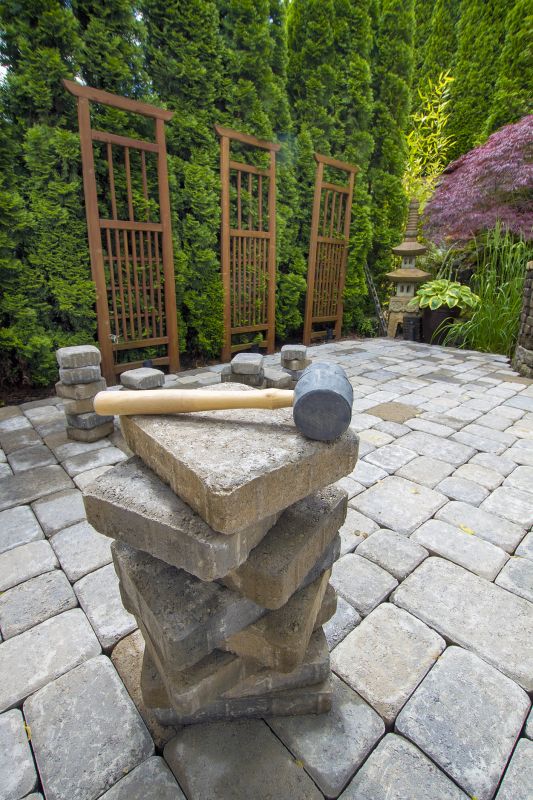Top Products For Pavers Installations To Enhance Durability
Explore essential tools and materials that ensure a professional finish and long-lasting paver projects.
 Installing pavers requires a combination of the right tools and materials to ensure a durable and visually appealing surface. The process typically begins with preparing the base, which involves excavating the area and laying a sturdy foundation. Proper base materials such as crushed stone or gravel are essential for stability and drainage. Once the foundation is set, pavers are laid in the desired pattern, often requiring precise leveling to achieve a professional finish.
Installing pavers requires a combination of the right tools and materials to ensure a durable and visually appealing surface. The process typically begins with preparing the base, which involves excavating the area and laying a sturdy foundation. Proper base materials such as crushed stone or gravel are essential for stability and drainage. Once the foundation is set, pavers are laid in the desired pattern, often requiring precise leveling to achieve a professional finish.
Top Overall Option
Versatile Paver Base Material
A high-quality paver base material that offers excellent compaction and drainage properties, providing a stable foundation for various paver types and project sizes. Its consistent particle size ensures easy leveling and long-term durability, making it a reliable choice for both DIY enthusiasts and professional installers.
Types of Products For Pavers Installations
Crushed Stone or Gravel
Fundamental for creating a stable foundation that promotes drainage and supports the weight of the pavers.
Polymeric Sand
A specially formulated jointing sand that hardens when moistened, helping to lock pavers in place and prevent weed growth.
Edging Restraints
Flexible or rigid edging materials that contain the pavers and maintain the integrity of the installation.
Compaction Equipment
Vibratory plate compactors or hand tampers used to firmly settle the base and pavers for a smooth surface.
Paver Sealers
Protective coatings that enhance appearance and help prevent staining or weathering over time.
Leveling Sand
A fine sand used to achieve a perfectly even surface before laying pavers.
Paver Edging Clips
Connectors that secure pavers to edging restraints for added stability.
Drainage Mats
Materials designed to improve water runoff and prevent pooling beneath pavers.
Paver Lifting Tools
Specialized tools to lift and reposition pavers during installation or repair.
Jointing Sealant
Sealants used to fill joints for additional stabilization and weather resistance.
Popular Choices
Widely used for filling joints between pavers to enhance stability and reduce weed growth.
A common choice for creating a solid foundation that supports paver installation.
Popular for maintaining the shape and alignment of paver surfaces.
Frequently used to ensure proper compaction of base materials and pavers.
Commonly selected for achieving an even surface before laying pavers.
Chosen for protecting paver surfaces and enhancing appearance.
Popular for filling gaps and providing additional weather resistance.
Useful for repositioning pavers during installation or repairs.
Selected to improve water runoff and prevent pooling.
Commonly used to secure paver edges and maintain installation shape.
To secure the pavers in place and prevent shifting over time, edging materials are used to create a boundary that holds everything firmly. Jointing sand or polymeric sand is then swept into the gaps between pavers, providing stability and preventing weed growth. Additional tools like compaction equipment help to settle the pavers evenly, ensuring a smooth surface. Proper selection and use of these products can make the installation process more efficient and the finished surface more resilient.
Choosing the right products for paver installation involves considering factors such as the type of pavers, the scope of the project, and environmental conditions. High-quality base materials and jointing products contribute significantly to the longevity of the installation. Whether for a small walkway or a large patio, having the appropriate tools and supplies can help achieve desired results while minimizing future maintenance needs. Investing in reliable, well-suited products is a key step toward a successful paver project.
Key Buying Considerations
- Type and size of pavers being installed to select compatible base and jointing materials.
- Soil and drainage conditions of the installation site to determine appropriate base materials.
- Project scope and size to estimate quantity and type of materials needed.
- Durability and load-bearing capacity required for the surface's intended use.
- Ease of installation and compatibility of products with existing tools and techniques.
- Weather conditions that may affect curing times and material performance.
- Long-term maintenance requirements and resistance to staining or weathering.
- Compatibility of jointing products with paver materials to ensure proper adhesion.
- Budget constraints while balancing quality and performance of materials.
- Availability of products and local supplier options for timely procurement.
- Environmental factors, such as exposure to moisture or temperature fluctuations, influencing product choice.
- Ease of future repairs or modifications to the paved surface.
- Safety considerations during installation, including handling and application of materials.
- Recommendations or guidelines provided by manufacturers for optimal results.
